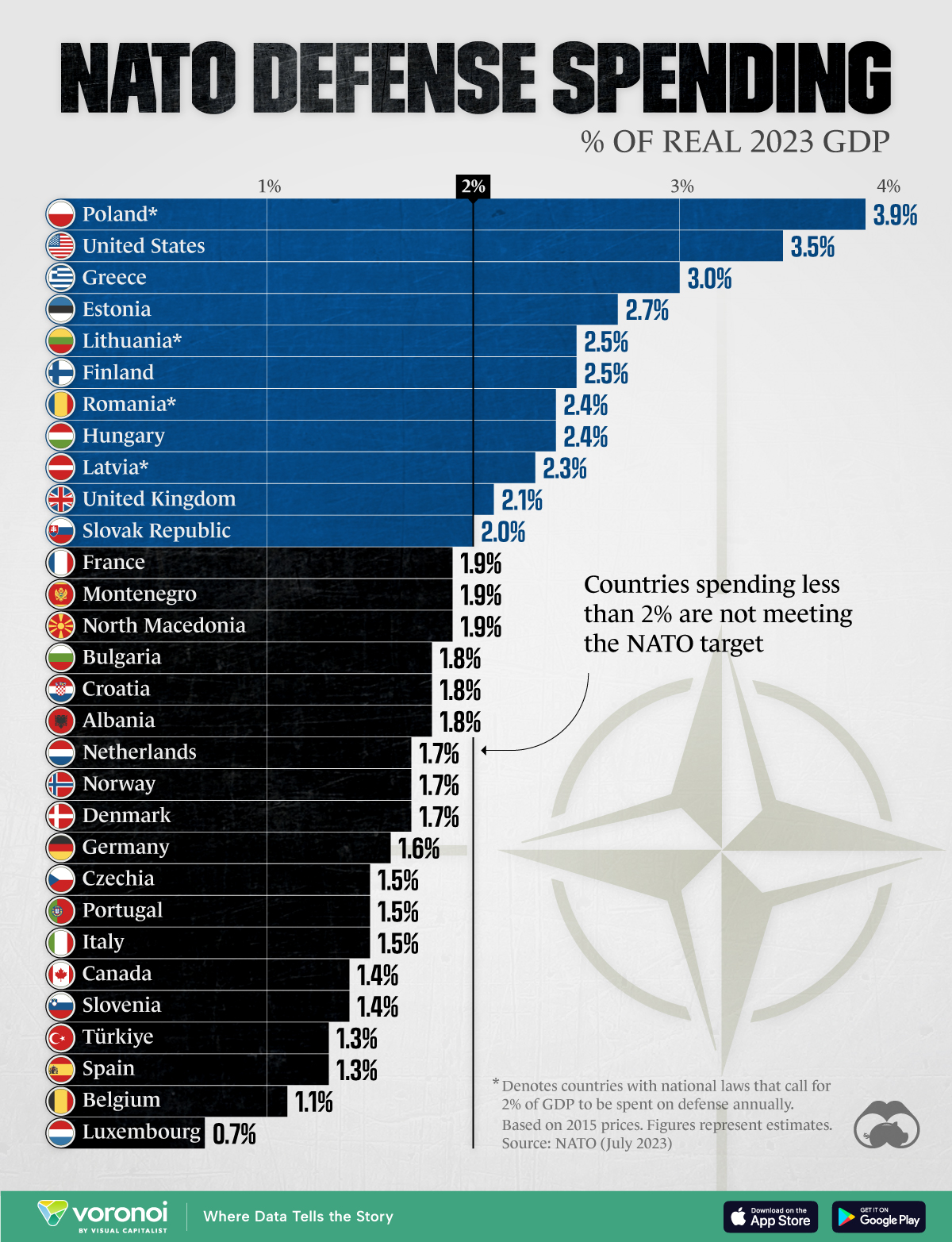I'll believe it when I see it.
You are using an out of date browser. It may not display this or other websites correctly.
You should upgrade or use an alternative browser.
You should upgrade or use an alternative browser.
Justin Trudeau hints at boosting Canada’s military spending
- Thread starter Maxman1
- Start date
Completely spitballing here, but the SOR arguments for the E-7 over the Bombardier would be range/endurance and interoperability, especially in the Arctic. I doubt that a business jet will have the range of a 737 airframe, and while Sweden is (now) a NATO ally, the E-7 is being used by 1 (soon to be 3) of the FVEY partners - currently Australia, but later the US and UK. There aren’t too many northern airfields in Canada or Alaska that could take a business jet, let alone a 737, so any missions will be pretty long.
You are thinking like a military member/supporter. Not a politician. From the latter's POV, buying a GlobalEye is win-win. The CAF gets the AEW they want and the voters get the jobs they want. Being ignorant of this kind of thinking or simply wishing it was is a foundational error on the part of CAF and departmental senior leadership. We can't avoid this mindset. So it's better if we just use it to our advantage.
On your specific example, it's quite easy for the government to buy GlobalEye's and simply improve airfields up north. "Hey look at our new Arctic Infrastructure Program that also counts as defence spending. Oh that development cheque we cut to Bombardier also counts towards our 2%."
ITBs aren’t a “veto” - they’re a percentage of the total bid (and not usually the largest percentage). The local lobby will lobby of course, but SOR requirements are given to the companies upfront. If one company doesn’t meet a mandatory requirement and the other one does…
You have only half the story. Not all ITBs are equal. There are two kinds of ITBs. Direct and Indirect. The latter is closer to traditional offsets. "We buy $10B from your company. You need to spend $10B in Canada." It's the directs that are the problem. This is the percentage that goes into the related industry. "We bought $10B worth of airplanes from your company. You need to spend $1.5B in our AEROSPACE SECTOR." Companies are usually okay with indirect offsets. They can buy a lot of Amish furniture for all their offices around the world if needed. They fight hard against direct offsets. Because that means rejigging their supply chain to replace an existing supplier with a Canadian supplier. And that's a lot harder to do, for a whole host of reasons.
- Reaction score
- 1,772
- Points
- 1,060
Not to beat the FWSAR project to death but wasnt there something about LM having an issue with simulator/training duplication?
Are the winning contracts decided by a committee?
Still doesnt get to the why on the technical points or how to weigh them. Or how we failed to test the Oshkosh MSVS properly and subsequently failed it, only for Oshkosh to win back its lost profits.
Mistakes are going to be made in the process and adjustments made. I'm curious about those adjustments
Whose to say we wouldnt have problems getting the C-27J up and running as well, its not like it or the G222 had a great reputation?
Are the winning contracts decided by a committee?
Still doesnt get to the why on the technical points or how to weigh them. Or how we failed to test the Oshkosh MSVS properly and subsequently failed it, only for Oshkosh to win back its lost profits.
Mistakes are going to be made in the process and adjustments made. I'm curious about those adjustments
Whose to say we wouldnt have problems getting the C-27J up and running as well, its not like it or the G222 had a great reputation?
Nobody is suggesting they'd be perfect. But replacing a Herc with a higher performing Herc would have been a much easier project.Not to beat the FWSAR project to death but wasnt there something about LM having an issue with simulator/training duplication?
No. Bid criterias have to be provided in advance. And bid scoring usually evolves multiple independent evaluators per criteria.Are the winning contracts decided by a committee?
If you're talking about FWSAR, the biggest change made was the dropping of simultaneity of performance criteria. With that criteria, the 295 would definitely not have been successful. They met all the range, speed and payload criterias. But could not meet them at the same time. When they threatened not to bid, Industry Canada went to bat for them by lobbying against the criteria. They wanted an Airbus bid, so that they could leverage more direct offsets from LockMart and Alenia.Still doesn't get to the why on the technical points or how to weigh them.
Having qualified on meeting range, speed and payload individually, Airbus just put up a lower price and offered more direct offsets than they knew Alenia could.
For one, we at least wouldn't have fundamental problems on range, speed and payload.Whose to say we wouldnt have problems getting the C-27J up and running as well, its not like it or the G222 had a great reputation?
Fabius
Sr. Member
- Reaction score
- 1,182
- Points
- 810
Great news out today from the Parliamentary Budget Office just in time for the NATO conference in Washington DC, which the PM and entourage just departed for.


 nationalpost.com
nationalpost.com

Ottawa overestimating defence spending, will only spend 1.42% of GDP on military by 2030: PBO
On the eve of a major NATO summit, the federal budget watchdog says the government is overestimating defence spending.
QV
Army.ca Veteran
- Reaction score
- 3,349
- Points
- 1,010
It's like the timing was planned.Great news out today from the Parliamentary Budget Office just in time for the NATO conference in Washington DC, which the PM and entourage just departed for.

Ottawa overestimating defence spending, will only spend 1.42% of GDP on military by 2030: PBO
On the eve of a major NATO summit, the federal budget watchdog says the government is overestimating defence spending.nationalpost.com
Quirky
Army.ca Veteran
- Reaction score
- 3,798
- Points
- 1,260
Great news out today from the Parliamentary Budget Office just in time for the NATO conference in Washington DC, which the PM and entourage just departed for.
Wasn’t he muzzled for his carbon tax report?
Anymore missteps he might fall out of a window..
- Reaction score
- 4,596
- Points
- 1,260
Just remember that when the PBO offers up an opinion you don't like about a politician you likeWasn’t he muzzled for his carbon tax report? Anymore missteps he might fall out of a window..
Here's the latest from the PBO info-machine ....

... and here's PBO's 2022 estimate ....

Good to see such "progress" ...
Halifax Tar
Army.ca Fixture
- Reaction score
- 11,939
- Points
- 1,260
We won’t get kicked out. We might stop being invited to the decision making tables and we might be told that someone more serious will replace us as lead in Latvia, but we aren’t getting kicked out.
Sally Soccer mom wouldn't bat an eye at any of those reactions.
Canadians heads are in the sand.
- Reaction score
- 19,869
- Points
- 1,280
Sally Soccer Mom doesn’t care if we’re in NATO or not.Sally Soccer mom wouldn't bat an eye at any of those reactions.
Canadians heads are in the sand.
She might care if Europe gets into a wider war though.
Halifax Tar
Army.ca Fixture
- Reaction score
- 11,939
- Points
- 1,260
Sally Soccer Mom doesn’t care if we’re in NATO or not.
She might care if Europe gets into a wider war though.
I doubt it. Canadians are pretty insular and happily ignorant about the world.
- Reaction score
- 19,869
- Points
- 1,280
In the same way that the average American, Australian, or someone not right next to a hotspot would be insular.I doubt it. Canadians are pretty insular and happily ignorant about the world.
If the UKR war spilled over to Poland or an established NATO country, I think the sentiment would change. The public has put it largely out of their minds because to them, the war has become static.
Halifax Tar
Army.ca Fixture
- Reaction score
- 11,939
- Points
- 1,260
In the same way that the average American, Australian, or someone not right next to a hotspot would be insular.
If the UKR war spilled over to Poland or an established NATO country, I think the sentiment would change. The public has put it largely out of their minds because to them, the war has become static.
I wish I had your optimism.
Support for the CAF is at best a mile wide and an inch thick.
- Reaction score
- 19,869
- Points
- 1,280
Agreed - but many Canadians trace their heritage to NATO countries. If those other countries get attacked, the war stops being “a Russia/Ukraine” thing and an “European” thing.I wish I had your optimism.
Support for the CAF is at best a mile wide and an inch thick.
I would suspect that the Polish-Canadian diaspora would care very much if Poland were attacked, etc.
OldSolduer
Army.ca Relic
- Reaction score
- 16,096
- Points
- 1,260
Is the PM going to get a verbal warning today at NATO?
Halifax Tar
Army.ca Fixture
- Reaction score
- 11,939
- Points
- 1,260
Agreed - but many Canadians trace their heritage to NATO countries. If those other countries get attacked, the war stops being “a Russia/Ukraine” thing and an “European” thing.
I would suspect that the Polish-Canadian diaspora would care very much if Poland were attacked, etc.
Ill give you a cheers when they themselves are lining up for the homeland across the sea.
Caring is one thing, its also hollow and cant really be measured. Show me actions. Deeds, not words.
- Reaction score
- 19,869
- Points
- 1,280
I’d suspect that much of the grassroots action would be like what Ukrainian-Canadians did - fundraising, accepting refugees, that sort of thing.Ill give you a cheers when they themselves are lining up for the homeland across the sea.
Caring is one thing, it’s also hollow and cant really be measured. Show me actions. Deeds, not words.
If Poland (for example) were attacked, it would be really hard not to justify NATO Article 5. They were/are skirting around taking action because UKR isn’t a NATO country. If RUS attacks an established one, then that situation is exactly why NATO was established.
Similar threads
- Article
- Replies
- 618
- Views
- 237K
- Replies
- 28
- Views
- 13K
- Replies
- 3
- Views
- 4K
- Replies
- 34
- Views
- 13K
- Replies
- 294
- Views
- 57K





